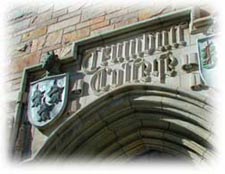 |
Who Yale HonorsBerkeley
College |
Trumbull College In 1736, the year before he married, Jonathan Trumbull purchased "Flora--a slave for life" with the aid of his father. (27) A few years later, Trumbull began a long career in the Colony's General Assembly. Among his duties were to enfore the Colony's Black Codes--laws applying only to people of color that circumscribed their freedom of movement and assembly. Trumbull adjudicated a case of "nightwalking" in 1758:
Twenty stripes were typically inflicted on those circulating in the streets after nine p.m. with no pass from their masters. Trumbull became the governor of the Connecticut colony in 1769. He was the only colonial governor to support American independence. Trumbull presided over Connecticut while slavery reached its peak, but also as it began to decline. As governor, he served ex officio on the Yale Corporation. As the spirit of independence began to sweep the country, Governor Trumbull was increasingly confronted by the contradictions between the institution of slavery and the principles of democracy (29). Governor Trumbull's own son, John Trumbull, published a scathing satirical attack on slavery in The Connecticut Journal and The New Haven Post-Boy on July 6, 1770. An eloquent attack on slavery during Trumbull's governorship was aired by the "Hartford Negro Men" who wrote two long letters. The second letter arrived in Trumbull's hands in 1780, as the state legislature debated a bill on gradual emancipation for the first time:
Their petition for freedom addressed the Governor as an equal, and used Christian doctrine to guarantee their claim to equality:
Historian Ira Berlin describes this sort of activism on the part of black people:
In 1779, Yale gave Trumbull an honorary degree. In 1784, Trumbull announced his retirement as governor a few months before the Connecticut legislature finally passed the "gradual emancipation" law, after discussing it actively for four years. Trumbull was a hero of the American Revolution. During his tenure as governor he presided over Connecticut while slavery was most prevalent, but he also cleared the way for gradual emancipation within the newly freed state.
|
|
 Trumbull
was the governor of Connecticut before, during, and after the American
Revolution. He graduated from Harvard in 1727. Through trade with the
West Indies, Jonathan Trumbull turned the small business he inherited
from his father into one of the most prosperous in Connecticut.
Trumbull
was the governor of Connecticut before, during, and after the American
Revolution. He graduated from Harvard in 1727. Through trade with the
West Indies, Jonathan Trumbull turned the small business he inherited
from his father into one of the most prosperous in Connecticut.